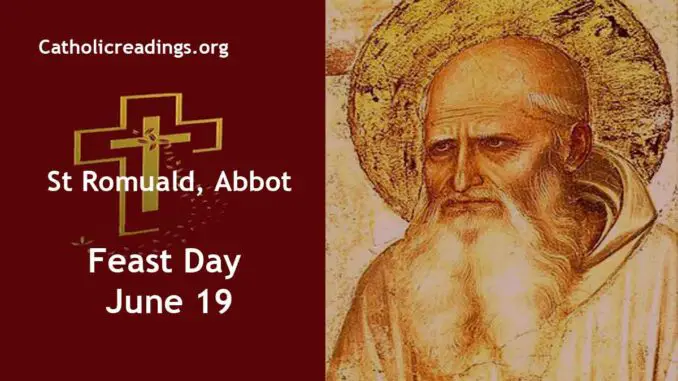St Romuald was also called Romualdus.
He was the founder of the Camaldolese order born in 951 AD in Ravenna, Italy.
He died on June 19 1027 at ValdiCastro in Fabriano, Italy.
His feast day is celebrated on June 19 every year in the Catholic Church.
| St Romuald, Abbot Biography | |
|---|---|
 St Romuald, Abbot – Feast Day – June 19 2026 | |
| Date of Birth | 951 AD |
| Place of Birth | Ravenna, Italy |
| Profession | Abbot and founder of the Camaldolese order |
| Place of Work | Italy |
| Date of Death | June 19 1027 |
| Place of Death | Monastery of Val-di-Castro, Italy |
| Feast Day | June 19 |
| Canonization | By Pope Gregory XIII in 1582 |
| Patron Saint of | Suwalki, Poland |
St Romuald Life History
St Romuald’s mother was Traversara Traversari and his father was Sergius degli Onesti. This was an aristocratic family.
Romuald indulged in the pleasures, trappings, and sins of the world in his youthful days. When he was twenty years old, he witnessed his father kill a relative in a fight over property.
Romuald was so distressed that he sought emotional refuge at the Basilica of Sant’Apollinare in Classe where he did penance for 40 days of penance.
Romuald remained undecided whether he wanted to become a monk there. This was because they were not strict enough in observance of discipline to his satisfaction.
He would correct his less dedicated peers, and this angered them a lot. Consequently, he was readily granted permission to move to Venice, where he met Marinus, a hermit who mentored and helped him to live a life of extraordinary severity.
At about 978 AD, Romuald was joined by Peter Urseolus (Pietro I Orseolo), Duke of Venice. Pietro I Orseolo had risen to power after he had deliberately failed to prevent the murder of his predecessor.
He became so remorseful for his crime that he abandoned his office and fled to Cuxa after getting advice from Romuald, Marinus and Guarinus, the Abbot of Saint-Michel-de-Cuxa, in Catalonia.
Romuald and Marinus constructed a hermitage near the monastery where, for about ten years, Romuald took advantage of the library of Cuxa to buttress his ideas and vision regarding monastic life.
Romuald spent the next 30 years going all over Italy, founding and reforming monasteries and hermitages.
His fame reached Otto III, the Holy Roman Emperor, who persuaded Romuald to occupy the office of abbot at Sant’Apollinare, which was vacant, and reform it.
Romuald faced stiff resistance from the monks, and one year later, out of frustration, he threw the abbot’s staff at Otto’s feet and resigned and retreated back to his solitary life.
St Romuald arrived at the Diocese of Arezzo in 1012 and was given land which later came to be called the Campus Maldoli, or Camaldoli.
The man who gave him the land said that he had seen there a vision of a mystic ladder, with white-clothed monks ascending by it to heaven.
Here, he built five cells for hermits and together with the monastery at Fontebuono that was built after two years, became the mother-house of the Camaldolese Order. Romuald founded monasteries around there, including Val di Castro monastery, where he died.
St Romuald Birth
He was born in 951 AD in Ravenna, Italy, to Traversara Traversari, his mother, and his father Sergius degli Onesti.
St Romuald Death
He died on June 19 1027 at the monastery of Val-di-Castro, Italy of natural causes
Saint Romuald Feast Day
St Romuald’s feast day was added to the saints’ calendar in 1594 to be celebrated on June 19 which was the date of his death.
The following year, Pope Clement VIII transferred it to February 7, which was the date when his relics were translated to Fabriano in 1481. But in 1969 the feast day was brought back to June 19.
Relics
St Romuald’s relics were found incorrupt on February 7 1481, and were enshrined at Fabriano, Italy.
Saint Romuald Canonization
St Romuald was canonized by Pope Gregory XIII in 1582.
Representation
St Romuald is represented as a monk pointing at a ladder on which other monks are ascending to heaven, indicative of the founding of his Order
Today’s Catholic Quote:
St. Romuald’s life teaches us that, if we only follow the impulse of the Holy Spirit, we shall easily find good everywhere, even on the most unlikely occasions.
Our own sins, the sins of others, their ill will against us, or our own mistakes and misfortunes, are equally capable of leading us, with softened hearts, to the feet of God’s mercy and love.
Related Links
Powered By SEO Experts
Follow @ReadingCatholic
